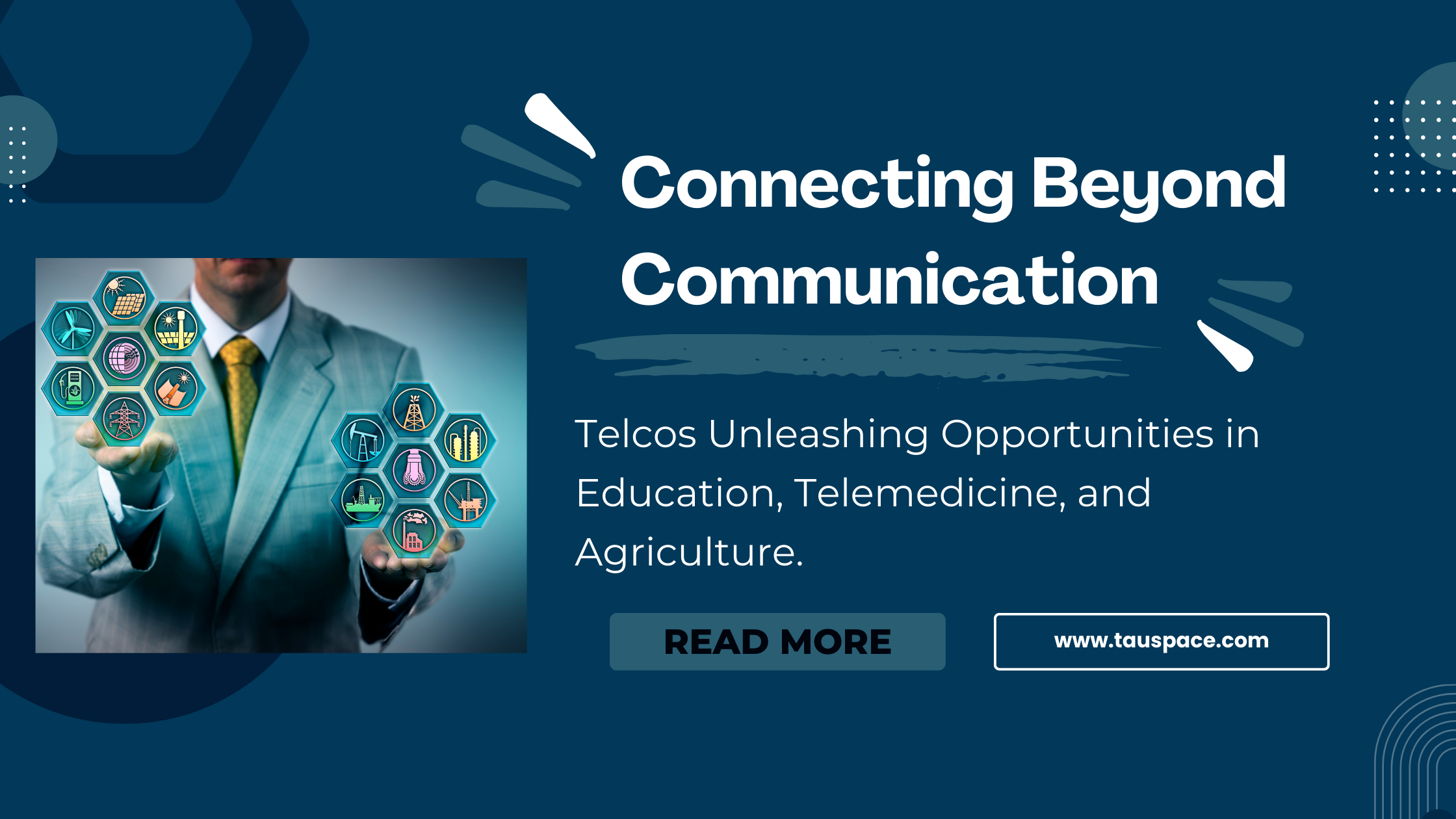In today’s digital age, telecommunications companies have transcended their traditional roles as mere service providers. They have evolved into enablers of connectivity and catalysts for progress across various sectors. As the world witnesses an increasing reliance on digital technologies, telcos are at the forefront, poised to unlock a multitude of opportunities in areas such as Education, Telemedicine and Healthcare, and Agriculture. These transformations are not only benefiting businesses but also playing a pivotal role in improving the lives of individuals across the globe.
Education: Enabling Access to Knowledge
Education is a fundamental human right, but access to quality education remains uneven across the globe. In Africa and other developing regions, millions of students face barriers to education due to geographical remoteness, limited resources, and insufficient infrastructure. Telcos can help bridge this educational divide in several ways:
- E-Learning and Remote Education: The COVID-19 pandemic accelerated the adoption of e-learning, and telcos were at the forefront. By providing high-speed internet access and mobile connectivity, telcos enabled students to access online resources and attend virtual classes.
- Access to Educational Content: Telcos can partner with educational content providers to offer students access to a wide range of resources, from e-books to video lectures. By zero-rating educational websites or apps, they can make these resources more affordable and accessible.
- Interactive Learning: Augmented Reality (AR) and Virtual Reality (VR) has the potential to revolutionise education. Telcos can invest in these technologies to create immersive learning experiences, such as virtual science labs or historical field trips.
- Customised Learning: Telcos can support the development of personalised learning platforms that adapt to the individual needs of students, helping to bridge learning disparities and improve educational outcomes.
- Teacher Training: Effective use of technology in education requires well-trained teachers. Telcos can offer programs to train educators in integrating technology into the classroom.
Telemedicine and Healthcare: Expanding Access to Health Services
Access to quality healthcare remains a critical challenge in many parts of the world, particularly in rural and underserved areas. Telcos are well-positioned to leverage their networks to bring healthcare services closer to those in need.
- Teleconsultations: Telcos enable telemedicine services that allow patients to consult with healthcare providers remotely. This is particularly crucial in regions with a shortage of medical professionals.
- Remote Patient Monitoring: Telcos facilitate the collection and transmission of vital health data, such as blood pressure, heart rate, and glucose levels, from patients to healthcare providers. This continuous monitoring aids in early diagnosis and timely intervention.
- E-Prescriptions and Health Records: Electronic prescriptions and health records enable healthcare providers to deliver better-coordinated care. Telcos can contribute to secure data exchange and storage for these records.
- mHealth Apps: Telcos can partner with developers to create and distribute mobile health (mHealth) apps that provide health information, symptom tracking, and medication reminders to users.
- Emergency Services: Quick and reliable communication is essential during medical emergencies. Telcos can enhance their networks to ensure that emergency calls are prioritised and remain stable in critical situations.
Agriculture: Boosting Farming Productivity
Agriculture is the backbone of many economies, especially in Africa. Telcos can revolutionise this sector by offering innovative solutions that enhance productivity, improve crop yields, and increase efficiency for farmers.
- IoT in Agriculture: The Internet of Things (IoT) can provide real-time data on soil moisture, weather conditions, and crop health. Telcos can offer connectivity solutions to farmers, enabling them to make data-driven decisions and optimise resource use.
- Market Access: Farmers can benefit from mobile apps and SMS services that provide market information, helping them get the best prices for their produce. Telcos can partner with agricultural organisations to create and maintain these services.
- Financial Services: Access to financial services is a critical factor in the growth of the agriculture sector. Telcos can offer mobile banking services that allow farmers to save, borrow, and manage their finances conveniently.
- Weather Forecasting: Agriculture is highly dependent on weather conditions. Telcos can provide farmers with accurate and up-to-date weather forecasts to help them plan planting and harvesting.
- Remote Expertise: Farmers can access agricultural experts remotely through video calls, which can be facilitated by telcos. This allows them to seek guidance on crop management, pest control, and other farming practices.
Unlocking Potential Through Collaborations and Innovations
Realising these opportunities in Education, Telemedicine/Healthcare, and Agriculture requires collaboration and innovation. Telcos can partner with governments, educational institutions, healthcare providers, and agricultural organizations to create comprehensive solutions tailored to the unique needs of each sector.
Innovations in technology, such as 5G networks, satellite internet, and edge computing, can further enhance telcos’ capabilities in serving these sectors. For instance, 5G’s high-speed, low-latency connectivity is essential for real-time applications like telemedicine and IoT devices in agriculture. Satellite internet can extend connectivity to remote areas where traditional infrastructure is lacking.
Overcoming Challenges
While the opportunities are vast, telcos must also overcome several challenges when entering these sectors. Regulatory hurdles, privacy concerns, and the need for significant investments in infrastructure and services are key obstacles. In Africa, particularly, the three main challenges [1] are:
- High cost of connectivity: Expensive data prices contribute to a growing digital divide between those with internet access and those without, posing a threat to regional stability.
- Limited access to rural areas: Accessing remote areas is costly, and the ROI for ISPs is low due to a small population pool. Thus, it is often economically unfeasible to invest in extending connectivity to these hard-to-reach places.
- Dilapidated infrastructure: The energy crisis in many parts of Africa affects not only telecoms but the overall economy. Poor infrastructure hampers the progress of expanding telecommunications services, undermining the region’s development.
However, with careful planning and a commitment to addressing these challenges, telcos can unlock the potential for positive impact in Education, Telemedicine and Healthcare, Agriculture, and various other economic sectors.
Conclusion
Telecommunications companies have a pivotal role to play in shaping the future of Education, Telemedicine and Healthcare, and Agriculture. By embracing innovation, investing in infrastructure, and collaborating with key stakeholders, telcos can connect communities, improve access to critical services, and drive economic growth in regions that need it the most.
As we move forward into an increasingly digital world, it is clear that telcos are more than just service providers; they are enablers of progress, fostering a brighter future for individuals, communities, and entire nations. Through their actions in Education, Telemedicine and Healthcare, and Agriculture, telcos are transforming connectivity into a catalyst for change.
The next chapter in the telco revolution is unfolding, and the opportunities to make a lasting impact are boundless. It’s a journey where connectivity transforms lives, empowers communities, and paves the way for a better tomorrow. The question is not whether telcos can seize these opportunities but how far they can reach and how many lives they can transform along the way.
[1] https://afr-ix.com/the-future-of-telecoms-in-africa/









